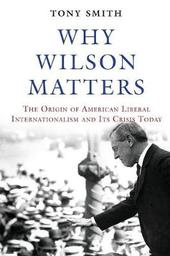
|
Why Wilson Matters: The Origin of American Liberal Internationalism and Its Crisis Today
Paperback / softback
Main Details
| Title |
Why Wilson Matters: The Origin of American Liberal Internationalism and Its Crisis Today
|
| Authors and Contributors |
By (author) Tony Smith
|
| Series | Princeton Studies in International History and Politics |
|---|
| Physical Properties |
| Format:Paperback / softback | | Pages:352 | | Dimensions(mm): Height 235,Width 152 |
|
| ISBN/Barcode |
9780691183480
|
| Audience | | Tertiary Education (US: College) | | Professional & Vocational | |
|---|
|
Publishing Details |
| Publisher |
Princeton University Press
|
| Imprint |
Princeton University Press
|
| Publication Date |
8 January 2019 |
| Publication Country |
United States
|
Description
How Woodrow Wilson's vision of making the world safe for democracy has been betrayed-and how America can fulfill it again The liberal internationalist tradition is credited with America's greatest triumphs as a world power-and also its biggest failures. Beginning in the 1940s, imbued with the spirit of Woodrow Wilson's efforts at the League of N
Author Biography
Tony Smith is the Cornelia M. Jackson Professor of Political Science at Tufts University. His many books include America's Mission: The United States and the Worldwide Struggle for Democracy and The Crisis of American Foreign Policy: Wilsonianism in the Twenty-First Century (both Princeton).
Reviews"A painstaking, take-no-prisoners attack on those who believe that America's historical experience can be duplicated everywhere. . . . This makes for powerful reading."---Robert Kaplan, Wall Street Journal "A valiant effort to assert that Woodrow Wilson's view of how America should relate to the world has relevance today. . . . Smith performs a service to readers looking to place current domestic political developments in historical context." * Publishers Weekly * "[Smith] wants to reclaim Wilson's historical memory to bolster the very idea of liberal internationalism, which he correctly considers under assault. For Smith, the problem is not that the United States stands for liberal values and seeks to promote democracy abroad; for too many, doing so has become synonymous with military force and overthrowing governments. The association of Wilson's precepts with the recent wars in Iraq, Afghanistan and Libya has caused many to question the wisdom of a vigorous American role in the world. The result, Smith argues, is that 'neo-Wilsonianism sabotaged the very tradition from which it had emerged.'"---Derek Chollet, The National Interest "Even a review as generous in length as H-Diplo allows cannot do justice to Smith's intellectual achievement in his reconsideration of Wilson. . . . The point is to evaluate the major actors, of whom this man stands paramount, for who they were and what they thought they were doing. As a scholar and our only professional academic to become president, Wilson would have wanted nothing less. Tony Smith's book takes us a long way down the path to a true understanding of this man and these events."---John Milton Cooper, Jr., H-Diplo Roundtable Review "A significant and highly original contribution to the scholarship on Wilson and Wilsonianism. The book manages to offer new insights to our understanding of Wilson as well an original critique of contemporary U.S. foreign policy--a major accomplishment that deserves praise. Moreover, the book is well written, engaging, and persuasive. . . . [It] deserves a wide readership not only by scholars but by anyone concerned with the practice of U.S. foreign policy."---Rasmus Sinding Sondergaard, H-Diplo Roundtable Review "Before he became president, Wilson was a prolific writer and a leading American scholar of democratic government, and Smith's major contribution is his reconstruction of Wilson's thinking from his books, papers, speeches, and letters. What emerges is a portrait not of a crusader or a utopian but of a realistic liberal who understood the deep and slow-forming foundations of modern democratic rule."---G. John Ikenberry, Foreign Affairs
|